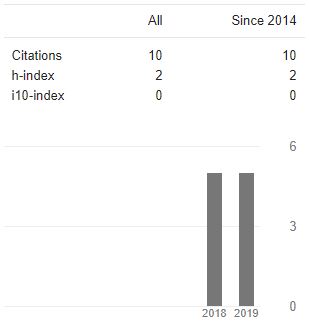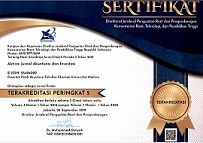PENGARUH SISTEM INFORMASI AKUNTANSI TERHADAP EFEKTIVITAS PENGENDALIAN PIUTANG DAN KOLEKTABILITAS PIUTANG TAK TERTAGIH PADA BPRS BHAKTI SUMEKAR CABANG PAMEKASAN
Abstract
The purpose of this study is to determine whether the sales accounting information system influences the effectiveness of receivables control and the effectiveness of collectibility of uncollectible receivables in BPRS Bhakti Sumekar, Pamekasan Branch. This type of research uses descriptive quantitative methods. Data collection is done using a questionnaire. From the results of the study it is known that there is a significant relationship between accounting information systems and the effectiveness of accounts receivable control and collectability of uncollectible accounts. The simple correlation coefficient (R) for the effectiveness of receivables control is 0.826, which means that the accounting information system has a close or strong relationship to the effectiveness of accounts receivable control, which is 0.826 or 82.6%. While collectibility of uncollectible accounts of 0.847 means that the input variable consisting of accounting information systems has a close or strong relationship to collectability of uncollectible accounts of 0.847 or 84.7%. The coefficient of determination for the effectiveness of accounts receivable control is obtained value (R2) = 0.683 which means that 68.3% of the effectiveness of the control of accounts receivable can be explained by the accounting information system while the remaining 31.7% is influenced by other variables outside the
model studied. uncollectible obtained value (R2) = 0.717 which means that 71.7% collectability of uncollectible accounts can be explained by accounting information systems while the remaining 28.3% is influenced by other variables outside the model studied.
Keywords
Full Text:
PDFReferences
Alvin, A. Arens, 2007, Auditing dan Pelayanan Verifikasi Jilid 1 : PendekatanTerpadu, dialih bahasakan oleh Tim Dejacarta, Edisi 9, Indeks : Jakarta.
Andreas. 2006. Analisis Sistem Informasi Akuntansi Penjualan TerhadapPenurunan Tingkat Piutang TakTertagih. Skripsi
Aryanto,Mahatmyo. 2014. Sistem Informasi Akuntansi Suatu Pengantar, Deepublish, yogyakarta
Christian, Victoria. 2015. Analisis Pengendalian Interna Piutang Usaha Pada Developer Grand Kawanua International City. Jurnal EMBA Vol. 3 No.1 Maret 2015, Hal. 286-296
Dr. La Midjan dan Azhar Susanto, 2001. Sistem Informasi Akuntansi I Edisi 8, Lingga Jaya, Bandung
Fakhri M. Husein, 2004, Sistem Informasi Akuntansi, Edisi Pertama: Jogjakarta
Fiqih, Abdul. 2010. “Analisis Faktor-Faktor yang Mempengaruhi Realisasi Penerimaan Pendapatan Asli Daerah (PAD) Kota Tanggerang pada tahun 2004-2008”, Skripsi UIN Syarif Hidayatullah Jakarta
Haryono, jusup, 2011, Dasar-dasar Akuntansi, sekolah tinggi ekonomi YKPN, Yogyakarta.
Idrus, Muhammad.MetodePenelitianIlmu Sosial Pendekatan Kualitatif dan Kuantitatif, (Jakarta: Erlangga), hlm., 100
Ikatan Akuntansi Indonesia, 2002, Standar Akuntansi Keuangan, Salemba Empat :Jakarta.
Ismail, Akuntansi Bank, Prenamedia Group, Rawamangun, Jakarta
Jogiyanto. 2005. Analisis dan Desain Sistem Informasi. Yogyakarta: Penerbit Andi.
Maulana Robi, 2016. Pengaruh Sistem Informasi Akuntansi Penjualan Terhadap Efektivitas Kolektibilitas Piutang Tak Tertagih Pada PT Colombus Showroom Majalengka. Jurnal Ilmiah Manajemen & Akuntansi Vol. 3. ISSN: 2356-3293
Moermahadi Soerja Djanegara dan Livia Ivonia. 2006. Evaluasi Pengendalian InternPenjualanKredit DalamMeningkatkanKolektibilitas PiutangpadaPT Austindo Nusantara Jaya Finance, Jurnal Umum
Mulyadi, 2001, Sistem Akuntansi : Sistem Penerimaan Kas, Edisi Empat :Jakarta
Mulyadi, 2004, Pemeriksaan Akuntansi, Edisi Ketiga, Yogyakarta, Penerbit Sekolah Tinggi Ekonomi YKPN.
Rahmawati Suci, 2015. Pengaruh Sistem Informasi Akuntansi Penjualan Terhadap Efektivitas Pengendalian Piutang Pada PT. Permata Finance Samarinda. Jurnal Universitas 17 Agustus 1945 Samarinda, Kalimatan Timur
Sugiyono. 2008. Metode Penelitian Bisnis. Bandung : CV. Alfabeta
Sugiri, Slamet dan Bogat Agus Riyono. 2008. Akuntansi Pengantar 1.Yogyakarta: STIM
Sumarsan, Thomas. 2013, Perpajakan Indonesia (Vol.3), Jakarta: PT Index
Rudianto, 2012, Pengantar Akuntansi, Jakarta, Penerbit Erlangga Adaptasi IFRS.
Stoner, James A.F, 2001. Managemen, Terjemahan Alfansus Sirait, Jilid I, Edisi kedua, Penerbit Erlangga, Jakarta.
Susanto, Azhar. 2004, Sistem Informasi Akuntansi I :Pendekatan Manual PratikaPenyusunan Metode dan Prosedur Edisi Kedelapan :Bandung
Swastha, Basu, 2000, Pengantar Bisnis Modern, Pengantar Ekonomi Perusahaan Modern, Jakarta : Liberty.
Sugiyono, 2006, Statistika untuk Penelitian, Alfabeta : Bandung
Sugiyono, 2014. “Metode Penelitian Kuantitatif Kualitatif dan R&D”, Alfabeta, Bandung.
Sunarto., 2003, Akuntansi Biaya, Edisi Revisi, AMUS, Yogyakarta
Wilkinson, Joseph W, 2000, Accounting Information System, Fourth Edison, yang dialih bahasakan oleh Agus Maulana : Jakarta
DOI: http://dx.doi.org/10.53712/aktiva.v4i1.567
Refbacks
- There are currently no refbacks.
Indexing:
Member Of:
Reference Manager:
Published by Prodi Akuntansi Fakultas Ekonomi Universitas Madura
Jl. Raya Panglegur Km 3,5 Pamekasan
Phone: (0324) 322231
website: http://ejournal.unira.ac.id/index.php/jurnal_aktiva/index
Email: jaa.unira@gmail.com
AKTIVA by Universitas Madura is licensed under a Creative Commons Attribution 4.0 International License.












